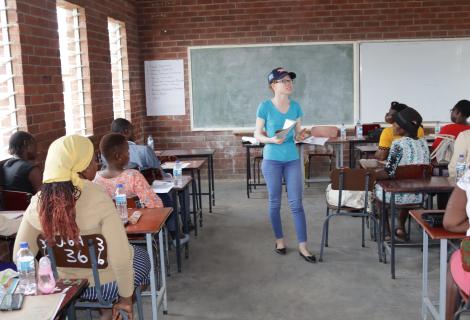Mainstreaming disability for improved quality of life for adolescent girls

Young woman defies odds
By Martin James, Project Officer Leonard Cheshire Disability Zimbabwe
Patience Muronzi (24) of Chitungwiza never ceases to astound the disability fraternity. She has exceeded society expectations to act against the exclusion faced by children with disabilities in mainstream schools and colleges to graduate with an Accounting Degree from a local university. Despite having albinism, she has been instrumental in advocating for the inclusion of persons with disabilities in her community as part of the implementation of the “Empowered adolescent Girls for Improved Quality of Life Programme.”
Patience has been supported by ActionAid Zimbabwe (AAZ) partner Leonard Cheshire Disability Zimbabwe (LCDZ) in partnership with Forum for African Women Educationalists Zimbabwe Chapter (FAWEZI) and the AIDS Counselling Trust (ACT).
Albinism is a range of disorders that result from a reduction or absence of melanin. These vary in severity and often cause white skin, light hair and vision problems and which has resulted in persons with disability being left out of mainstream development.
Patience community trainings on “Parenting using the Family Matters Curriculum for caregivers and parents for children with disabilities” have changed attitudes of many parents of children with disabilities. Because of the stigma, myths, beliefs and misconceptions attached to disabilities, parents and care givers of such children tend to hide the children from the public. Parents admitted during the trainings conducted by Patience that they are always worried that something might happen to their children if they mingle with others.
One parent said that she had over the years been over-protective of her daughter and rarely took her out of the house. She admitted that her daughter had no knowledge about her sexual reproductive health rights (SRHR) as she neither has peers to socialise with nor was she ever at school. “Who is interested in a cripple after all. That is why I used to keep my daughter at home,” said one parent.
Patience is a living example to explain to the parents of children with disabilities that all children are important and should be released to learn about life including learning about SRHR. According to World Health Organisation (WHO) World Report on Disability for 2018, people with disabilities are sexually assaulted at nearly three times the rate of people without disabilities. Patience told the parents of children with disabilities that 60 % of people with disabilities especially females had at one time in their lives been subjected to some form of unwanted sexual activity citing the 2018 WHO Report on Disability. Unfortunately, almost half never reported the assault as they had not been empowered on their rights, said Patience quoting the WHO report. In general, people with disabilities experience domestic and sexual violence at higher rates than people who do not have any form of disability according to the WHO Report on Disability.
“Society should not cripple children with disability further by denying them their right to information for example on SRHR, life skills and any form of education, “said the enthusiastic Patience who said she was one of the lucky young ones to learn about SRHR from her father. Urging other parents of children with disability to emulate her father, Patience said fathers should break the gendered stereotypes by getting close to their children and support them on SRHR issues irrespective of them being males.
Patience’s key note session on SRHR hinges on the need for male guardians to take an active role in educating their children on SRHR. “It was my father who guided me through the biological phenomena of the menstrual cycle. Had it not been for him, I would have led a very stressful adolescent life,” said Patience, a real-life model on how good parenting can shape the future of children with disabilities positively.
At her youthful age, Patience has been able to captivate parents, caregivers and teachers of children with disabilities. She has trained them on the need for them to provide sex education to their children. She said they should understand the physical and reproductive changes their children go through during puberty and adolescence and learn the ways to communicate their values to their children.
Parents and caregivers left the sessions conducted by Patience armed with tools and strategies for communicating with their children about SRHR. Patience has reached out to 47 female and 16 male parents or guardians in Chitungwiza in 2019. The Adolescent Girls for Improved Quality of Life Programme aims to aims to increase empowerment and improved quality of life among adolescent girls in Shamva, Chitungwiza and Hopely by implementing unique best practices and models to address three areas namely: Violence against Women and Girls (VAWG), Comprehensive Sexuality Education (CSE) and Economic Empowerment (EE). It aims to reach 210 adolescents with disabilities, the majority being female by July 2020.